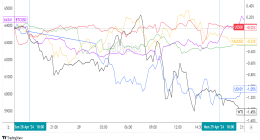
Companies rely on real-world data to train artificial-intelligence models that can identify anomalies, make predictions and generate insights. But often, it isn’t enough.
To detect credit-card fraud, for example, researchers train AI models to look for specific patterns of known suspicious behavior, gleaned from troves of data. But unique, or rare, types of fraud are difficult to detect when there isn’t enough data to support the algorithm’s training.
To…
This post first appeared on wsj.com









